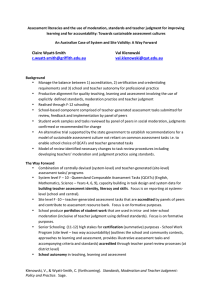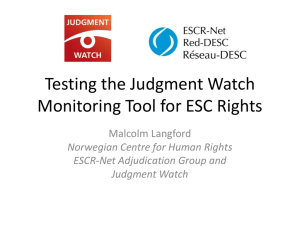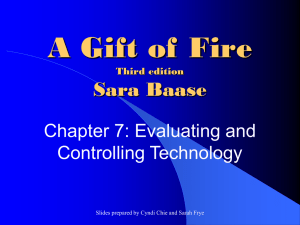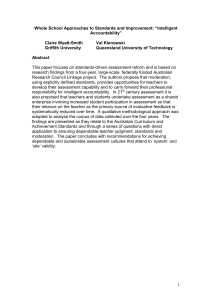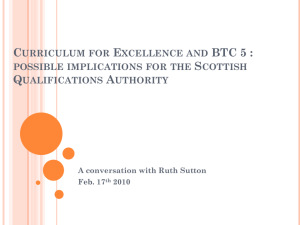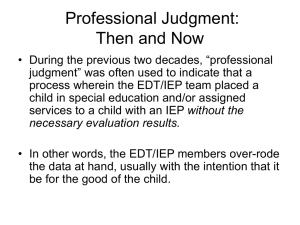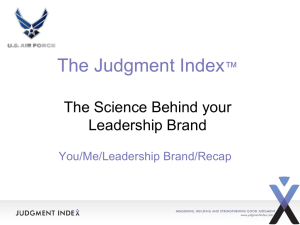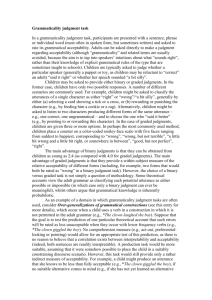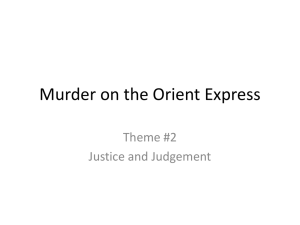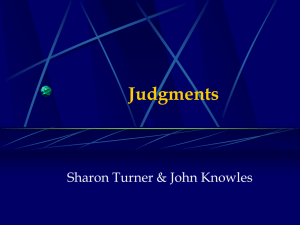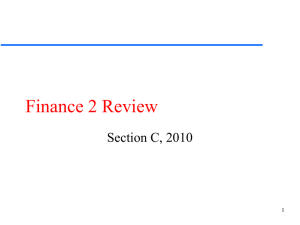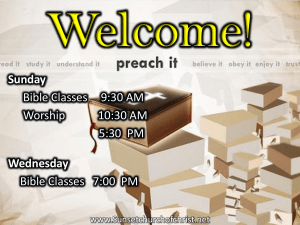information technology - Australian Curriculum Studies Association
advertisement
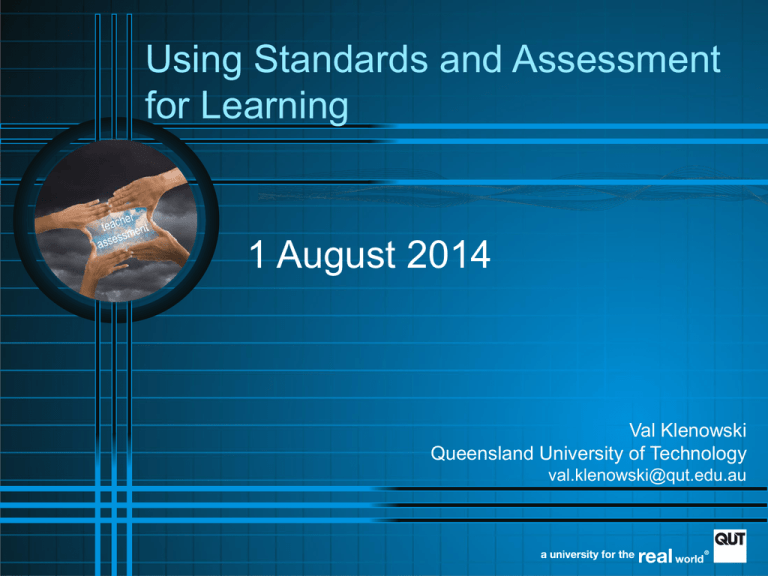
Using Standards and Assessment for Learning 1 August 2014 Val Klenowski Queensland University of Technology val.klenowski@qut.edu.au Aims of Workshop • Revisit the principles for using assessment for the support of learning • Demonstrate how to involve students in the use of standards to improve learning • Introduce a pedagogic practice for the use of standards for developing judgment and decision-making Background • The learning power of assessment • Changing demands of assessment policy • Building teachers’ assessment and digital literacies • International comparative analysis data • National curriculum and assessment • Standards-driven reform Drivers for Increased Use of Evaluation and Assessment • An increased requirement for effectiveness, equity and quality in education to meet economic and social demands. • A trend in education towards greater school autonomy, which has led to a need to monitor schools’ improvement. • Developments in information technology, which allow for both large-scale and individualised student assessment and facilitate the sharing and management of data. • Greater reliance on evaluation results for evidence-based decision making. “Synergies for Better Learning: An International Perspective on Evaluation and Assessment” (OECD, 2013, p.13) Recommendations from OECD Reviews 1. Integrate student assessment and school evaluation in a single framework which ‘articulates ways to achieve the coherence between its different components’; 2. Align assessment and evaluation with educational goals and learning objectives set out in the curriculum; 3. Design the accountability uses of evaluation and assessment in ways that minimise undesirable effects; Recommendations from OECD Reviews 4. Use measures of performance that are broad enough to capture the whole range of student learning objectives; 5. Focus on improving classroom practices and build on teacher professionalism (…promote regular use of evaluation and assessment results for improvements in the classroom.); 6. Place student at the centre, the fostering engagement in learning through using formative assessment strategies. (ARG & BERA, 2013) Australian Curriculum, Assessment and Reporting Authority (ACARA) Assessment • Standards-based • Achievement standards for P-10 • A statement of learning typically expected for each year level • Expectation of the depth of understanding, the extent of knowledge and the sophistication of the skills for each year level • A set of work samples to illustrate the differences in quality of aspects of expected learning in student work Standards Standards ‘fixed points of reference for assessing individual students’ (Sadler, 1987: 191) Standards - referenced Teachers draw on their assessment connects a professional knowledge student’s actual and expertise to make achievement with judgments of the quality grades or levels or grading decisions Standards Reference points for teachers to use for judging how well students have demonstrated what they have learned. Standards acquire meaning and have meaning ascribed to them through use over time and as understandings develop within communities of users. Standards, moderation and teacher judgment are all required – evidence, exemplars, consistency, comparability, agreement, learning improvement Representation of Standards • Important to use the variables of: – Concept/skill – Verb/cognition – Degree/qualities • Too often only two variables are used such that the standard describes more or different work for each level of the standard • For example, words such as ‘evaluates’ or ‘analyses’ used to describe the A standard and ‘identifies’ to describe the D standard indicates that what is being assessed at the levels of the standard are very different. ACARA Achievement Standard Year 9 Australian Curriculum: • By the end of Year 9, students refer to key events and the actions of individuals and groups to explain patterns of change and continuity over time. They analyse the causes and effects of events and developments and make judgments about their importance. They explain the motives and actions of people at the time. Students explain the significance of these events and developments over the short and long term. They explain different interpretations of the past. • Students sequence events and developments within a chronological framework, with reference to periods of time and their duration. When researching, students develop different kinds of questions to frame an historical inquiry. • They interpret, process, analyse and organise information from a range of primary and secondary sources and use it as evidence to answer inquiry questions. Students examine sources to compare different points of view. When evaluating these sources, they analyse origin and purpose, and draw conclusions about their usefulness. They develop their own interpretations about the past. Students develop texts, particularly explanations and discussions, incorporating historical interpretations. In developing these texts, and organising and presenting their conclusions, they use historical terms and concepts, evidence identified in sources, and they reference these sources. Representation of Standards • The ways in which standards are formulated and represented influence the particular approach teachers adopt to judgment • For example, standards represented: – in a matrix format suggests an analytic approach to judgment – as continua suggest a more holistic approach to judgment Judgment Practice Teachers draw on these intellectual and experiential resources when making a judgment of student work: • Superior knowledge about the content to be learned • Sound knowledge of criteria and standards • Evaluative skill in making judgments about students’ efforts on similar tasks in the past • Attitudes towards teaching, towards learners, ability to empathise with students who are learning, desire to help students develop, improve and do better, personal concern for feedback and veracity of their own judgments, and their patterns in offering help. (Sadler, 1998: 80-2) Action Research and Critical Reflection • Issue, concern or problem identified What practices constitute effective educational assessment at the classroom level? • Question/s • Research approach/ methods • Strategic Plan • Action • Professional Practice Research Questions How do we incorporate into teaching and learning practices, assessment that is formative in both function and purpose, and puts the student at the centre of the assessment process? What are the processes and procedures by which the meanings of stated standards for assessment tasks, are shared with students, to enable them to articulate their own learning through self-assessment? Action Research Aims • Attempted to create a community of shared practice. • Peer observation, peer teaching and peer assessment to enhance our own teaching and professional development. • Pedagogical approach involved an interactive curriculum design to engage students in discussion and critical debate. Lessons involved – – – – – – – Input and presentation to the students Active tasks performed by students Student presentation of their work Demonstrations of learning Group work Individual reflection Synthesis and summation by all Research • Students’ learning was assessed summatively by means of an assignment. • Students were provided with feedback on draft work plus a workshop that focused on the use, implementation and interpretation of assessment criteria for the assessment task. Action – Intervention in teaching, curriculum and assessment • Students provided with grade related criteria or achievement standards (A-E) • In working groups students were asked to identify the criteria for each standard. 1. Each student considered the criteria on his or her own. 2. In groups students discussed the criteria 3. Each group then identified the criteria embedded within the standard descriptor 4. Each group’s interpretation of the criteria was then presented and discussed in a plenary session. Research Findings Defined standards: • inform teacher judgment of system level expectations • inform teaching and student learning for improvement • support student self- and peer-assessment by reducing student dependence on the teacher as the primary or sole source of evaluative feedback. Principle: Standards need to be validated through interpretation and negotiation in moderation practice and should be empirically derived. Implications for policy, practice and research • Standards-moderation-judgment require a suite of resources • Statements of standards are required • Illustrative exemplars of folios of work (body of evidence) or single tasks • Processes for arriving at an overall judgment taking account of trade-offs or compensatory factors articulated by use of a evaluative commentary • Teacher judgment is under-researched and in its infancy Thank you! Contact val.klenowski@qut.edu.au References Assessment Reform Group and British Educational Research Association (2013) A Response to DFE’s 2013 consultation on: Primary assessment and accountability under the new national curriculum Klenowski, V. & Wyatt-Smith, C. (2014) Assessment for Education: Standards, judgment and Moderation, London: Sage. Maxwell, G. S. (2007) Implications for moderation proposed changes to senior secondary school syllabuses, Accessed from https://webmail.qsa.qld.edu.au/downloads/publications/snr_syll_rv_paper_imp_mod.pdf Newton, P. (2010) ‘The multiple purposes of assessment’, International Encyclopaedia of Education, 3: 392–6. Queensland Studies Authority (2012) ‘Reporting student achievement and progress P–10 Advice and Guidelines’ (Draft) (www.qsa.qld.edu.au) p. 13. Rowntree, D. (1987) Assessing Students: How Shall We Know Them? London: Kogan Page. Sadler, D.R. (1998) Formative Assessment: Revisiting the Territory, Assessment in Education: Principles, Policy and Practice, 5 (1), pp. 77-84. Wyatt-Smith, C., Klenowski, V. & Colbert, P. (eds) (2014) Designing Assessment for Quality Learning, Dordrecht: Springer. Wyatt-Smith, C. & Klenowski, V. (2013) ‘Connecting Curriculum, Standards and Assessment for Quality Learning in Demanding Times’, Poster presentation, American Educational Research Association Conference, San Francisco, April.
